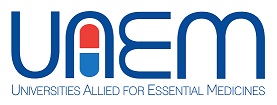This article may contain excessive or inappropriate references to self-published sources .(November 2016) |
 | |
| Founded | 2014 |
|---|---|
| Focus | accessibility to essential medicine |
| Location |
|
| Subsidiaries | Maastricht University |
| Volunteers | 35 |
| Website | www |
UAEM Maastricht chapter is the first chapter in The Netherlands that succeeded in making an agreement with the university signing the Socially Responsible Research and Licensing (SRRL) policy. "Access to Medicine" is the aim of the organization with focus on the Research and Development system and shared decision making with Maastricht University to actively pursue the goals drafted in Socially Responsible Research and Licensing (SRRL) policy. UAEM Maastricht has two active taskforces namely policy and awareness. [1] [2]